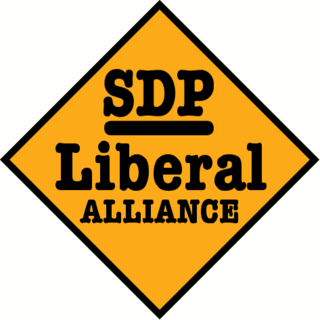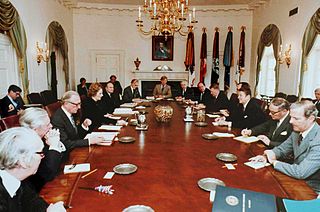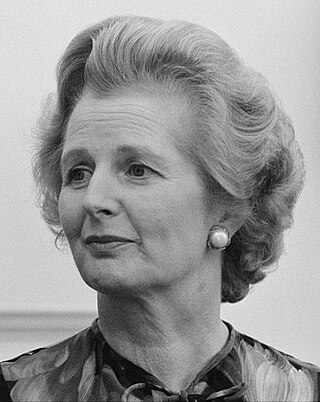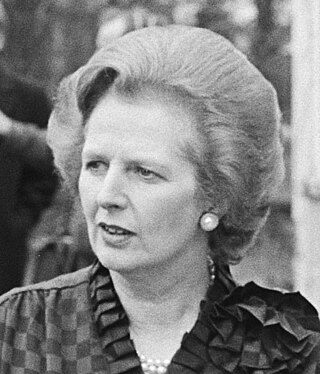
Margaret Hilda Thatcher, Baroness Thatcher, was a British stateswoman and Conservative politician who served as Prime Minister of the United Kingdom from 1979 to 1990 and Leader of the Conservative Party from 1975 to 1990. She was the longest-serving British prime minister of the 20th century and the first woman to hold the position. As prime minister, she implemented economic policies known as Thatcherism. A Soviet journalist dubbed her the "Iron Lady", a nickname that became associated with her uncompromising politics and leadership style.

Norman Stewart Hughson Lamont, Baron Lamont of Lerwick, is a British politician and former Conservative MP for Kingston-upon-Thames. He served as Chancellor of the Exchequer from 1990 until 1993. He was created a life peer in 1998. Lamont was a supporter of the Eurosceptic organisation Leave Means Leave.

The SDP–Liberal Alliance was a centrist and social liberal political and electoral alliance in the United Kingdom.

Richard Edward Geoffrey Howe, Baron Howe of Aberavon,, known from 1970 to 1992 as Sir Geoffrey Howe, was a British politician who served as Deputy Prime Minister of the United Kingdom from 1989 to 1990. A member of the Conservative Party, he was Margaret Thatcher's longest-serving Cabinet minister, successively holding the posts of chancellor of the Exchequer, foreign secretary, and finally leader of the House of Commons, deputy prime minister and lord president of the Council. His resignation on 1 November 1990 is widely considered to have precipitated the leadership challenge that led to Thatcher's resignation three weeks later.

The modern political history of the United Kingdom (1979–present) began when Margaret Thatcher gained power in 1979, giving rise to 18 years of Conservative government. Victory in the Falklands War (1982) and the government's strong opposition to trade unions helped lead the Conservative Party to another three terms in government. Thatcher initially pursued monetarist policies and went on to privatise many of Britain's nationalised companies such as British Telecom, British Gas Corporation, British Airways and British Steel Corporation. She kept the National Health Service. The controversial "poll tax" to fund local government was unpopular, and the Conservatives removed Thatcher as prime minister in 1990, although Michael Heseltine, the minister who did much to undermine her, did not personally benefit from her being ousted.

Margaret Thatcher's tenure as Prime Minister of the United Kingdom began on 4 May 1979 when she accepted an invitation from Queen Elizabeth II to form a government, succeeding James Callaghan of the Labour Party, and ended on 28 November 1990 upon her resignation. She was elected to the position in 1979, having led the Conservative Party since 1975, and won landslide re-elections for the Conservatives in 1983 and 1987. She gained intense media attention as Britain's first female prime minister, and was the longest-serving British prime minister of the 20th century. Her premiership ended when she withdrew from the 1990 Conservative leadership election. As prime minister, Thatcher also served simultaneously as First Lord of the Treasury, Minister for the Civil Service, and Leader of the Conservative Party.
Tory! Tory! Tory! is a 2006 BBC Television documentary series on the history of the people and ideas that formed Thatcherism told through the eyes of those on the New Right. It was nominated for the best Historical Documentary at the Grierson Awards in 2006. The name is based on the 1970 Pearl Harbor war film Tora! Tora! Tora!

Margaret Thatcher was Prime Minister of the United Kingdom from 4 May 1979 to 28 November 1990, during which time she led a Conservative majority government. She was the first woman to hold that office. During her premiership, Thatcher moved to liberalise the British economy through deregulation, privatisation, and the promotion of entrepreneurialism.

Margaret Thatcher became the first female Leader of the Conservative Party and Leader of the Opposition after winning the 1975 leadership election, the first Conservative leadership election where the post was not vacant. A rule change to enable the election was largely prompted by dissatisfaction with the incumbent leader, Edward Heath, who had lost three of four general elections as leader, including two in 1974. After announcing her first Shadow Cabinet in February 1975, she reshuffled it twice: in January and November 1976. Minor subsequent changes were necessary to respond to various circumstances. Thatcher's Shadow Cabinet ceased to exist upon her becoming Prime Minister following the 1979 general election.

The 1981 United Kingdom budget was delivered by Geoffrey Howe, the then Chancellor of the Exchequer, to the House of Commons on 10 March 1981. It was Geoffrey Howe's third budget and the second of the first Thatcher ministry. The budget represented a strongly monetarist response to the stagflation and high government borrowing which the UK was suffering at the time. The budget speech lasted for 91 minutes.

The Gang of 25 or the Group of 25 was a cohort of British Conservative Party backbench members of Parliament (MPs) that threatened to vote against prime minister Margaret Thatcher's 1981 Autumn Statement. The statement contained monetarist measures to control inflation. Similar measures introduced since 1979 had reduced inflation but caused job losses in the manufacturing sector.

The 1972 United Kingdom budget was a budget delivered by Anthony Barber, the Chancellor of the Exchequer, on 21 March 1972. The budget is remembered for its large tax cuts, and led to high inflation and demands for higher wages, as well as the 1976 sterling crisis when the UK government was forced to ask the International Monetary Fund for financial help. It also led the Conservative Party to abandon "Post-war consensus" policies.

The June 1979 United Kingdom budget was delivered by Geoffrey Howe, the Chancellor of the Exchequer, to the House of Commons on 12 June 1979. It was Howe's first budget and the first of the first Thatcher ministry, which had been elected a few weeks earlier. It was also the second budget to be delivered to Parliament in 1979. The budget marked a major change in direction for the UK economy, with an increase in reliance on interest rates and monetary policy to control inflation. It is also noted for its introduction of substantial tax cuts, such as reducing the top rate of income tax from 83% to 60% and the basic rate from 33% to 30%. The budget also saw an increase in VAT from 8% to 15%.

The 1988 United Kingdom budget was delivered by Nigel Lawson, the Chancellor of the Exchequer, to the House of Commons on 15 March 1988. It was the fifth budget to be delivered by Lawson during his tenure as Chancellor, and marked major changes to taxation, with reductions in income tax and changes to inheritance tax rules, as well as changes to mortgage interest relief that prevented homebuyers from being able to pool mortgage allowances. The changes announced to mortgage relief ultimately helped to further fuel an ongoing property boom which led to a rise in inflation and an increase in interest rates. Due to frequent disruptions during the Chancellor's speech, Deputy Speaker Harold Walker was required to suspend proceedings in what was described as an outbreak of "grave disorder".

The 1996 United Kingdom budget was delivered by Kenneth Clarke, the Chancellor of the Exchequer, to the House of Commons on 26 November 1996. It was Clarke's fourth budget, the last to be delivered during his tenure as chancellor, the last budget to be presented by the Conservative government of John Major before the party was defeated by Labour in the 1997 general election, and it was the last fully Conservative budget until July 2015. Prior to Clarke's budget statement being presented to the House of Commons, its contents were leaked to the Daily Mirror, which returned the document to the government but decided to print some of the details, thus helping Tony Blair, then the leader of the Opposition, to prepare his response. Clarke described his statement as one that outlined a "Rolls-Royce recovery – built to last" and predicted economic growth of 2.5% for 1997 and 3.5% for 1998, but Blair dismissed it as "a last-gasp budget of a government whose time is up".

The 1994 United Kingdom budget was delivered by Kenneth Clarke, the Chancellor of the Exchequer, to the House of Commons on 29 November 1994. It was the second budget to be presented by Clarke since his appointment as chancellor the previous year, and its central focus was a planned £24bn worth of tax cuts. Clarke also renewed his commitment to increasing Value Added Tax (VAT) on fuel, but pledged to soften the impact this would have on pensioners. The statement took place shortly after the Party Whip had been withdrawn from eight Conservative backbenchers, leaving the government without a working majority, and amid questions about the future of John Major's leadership of the party. In response to the budget, Tony Blair, leader of the Labour Party, said it would be remembered as the "VAT on fuel budget".

The November 1993 United Kingdom budget was delivered by Kenneth Clarke, the Chancellor of the Exchequer, to the House of Commons on 30 November 1993. It was the second budget to be presented in 1993, and the first to be presented by Clarke following his appointment as Chancellor by Prime Minister John Major earlier that year. The November 1993 budget was also the first in the modern era to be held in the autumn, the government having decided to move the date of the budget so it could outline its tax and spending plans at the same time.

The 1991 United Kingdom budget was delivered by Norman Lamont, the Chancellor of the Exchequer, to the House of Commons on 19 March 1991. It was Lamont's inaugural budget following his appointment as chancellor by Prime Minister John Major, and the first to be presented following the resignation of Margaret Thatcher as Prime Minister the previous autumn.

The 1985 United Kingdom budget was delivered by Nigel Lawson, the Chancellor of the Exchequer, to the House of Commons on 19 March 1985. The second budget to be presented by Lawson, it was held shortly after the end of the year-long 1984–85 miners' strike. The chancellor said the cost of the strike on public borrowing had impacted on his plans for tax reductions, although he did make some changes to income tax personal allowances and stamp duty. Changes to National Insurance were also announced, but threatened to place extra costs on employers.

The 1983 United Kingdom budget was delivered by Geoffrey Howe, the Chancellor of the Exchequer, to the House of Commons on 15 March 1983. It was the final budget to be presented before the 1983 general election and the last to be presented by Howe. He announced a programme of tax cuts worth around £2bn for individuals and £750m for business, as well as increasing personal allowances by 14%, 8.5% above the rate of inflation. Social Security benefits were also raised. The Conservatives went on to win the election, but Howe would subsequently be replaced as chancellor by Nigel Lawson in a post-election cabinet reshuffle.











